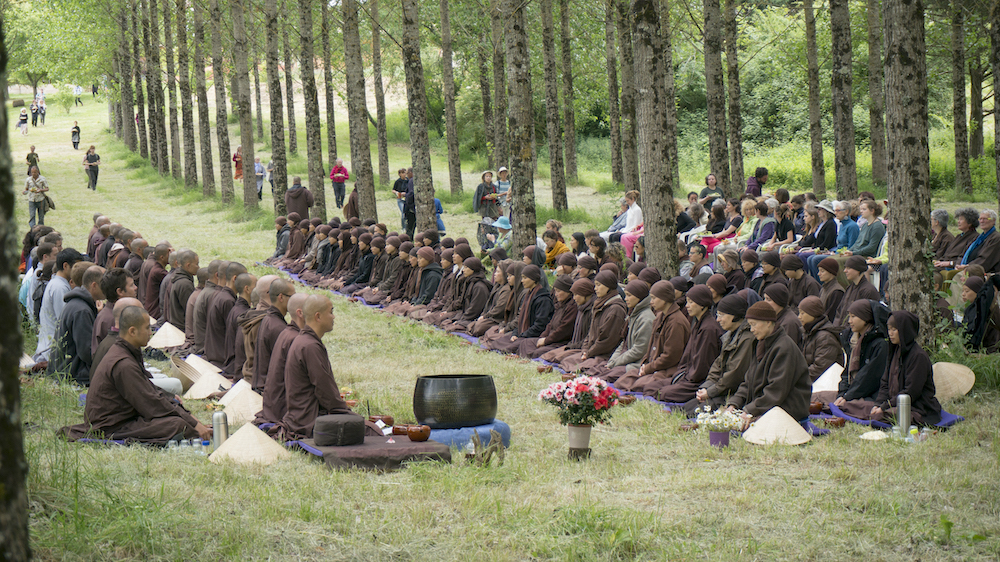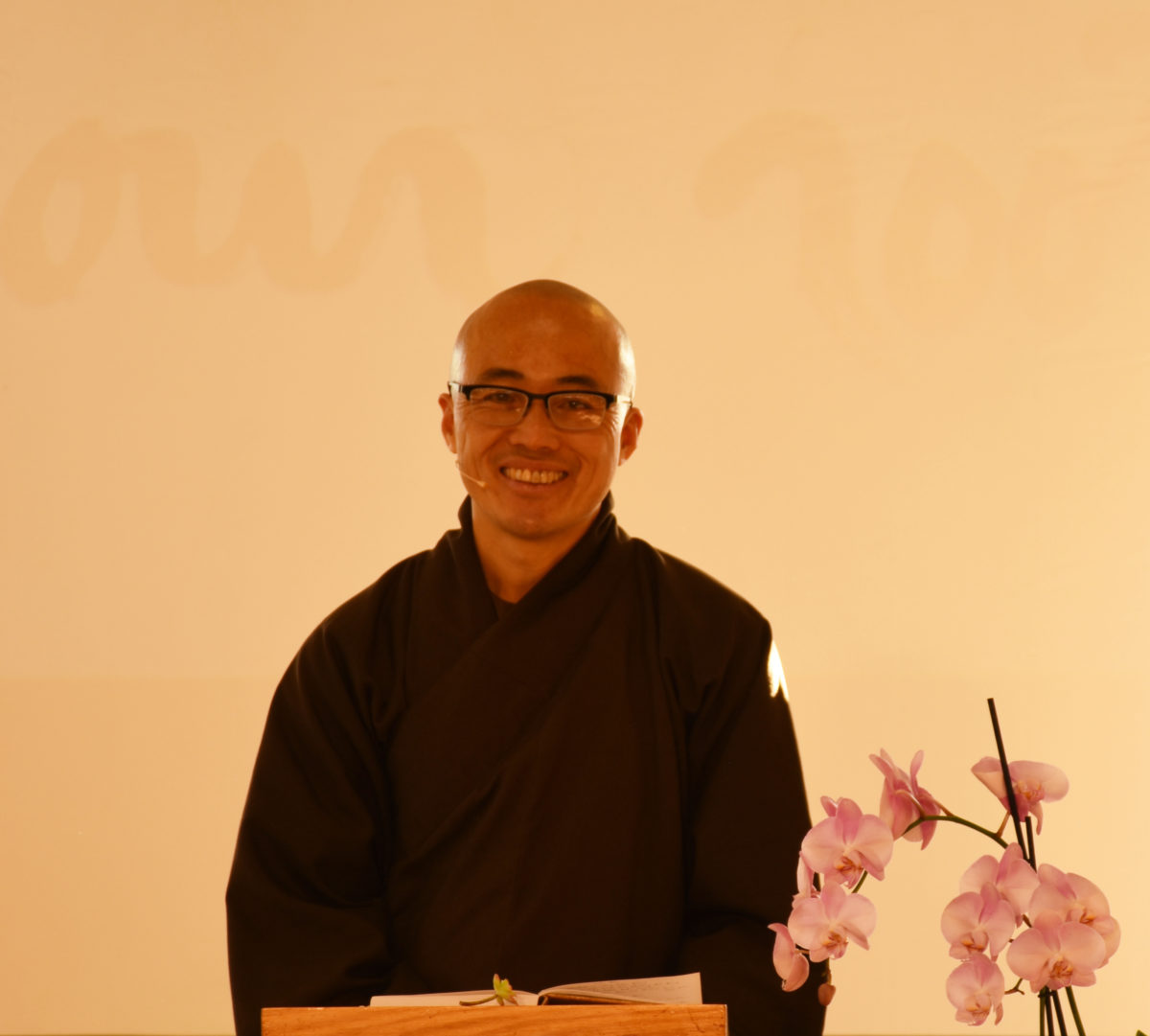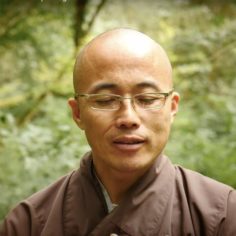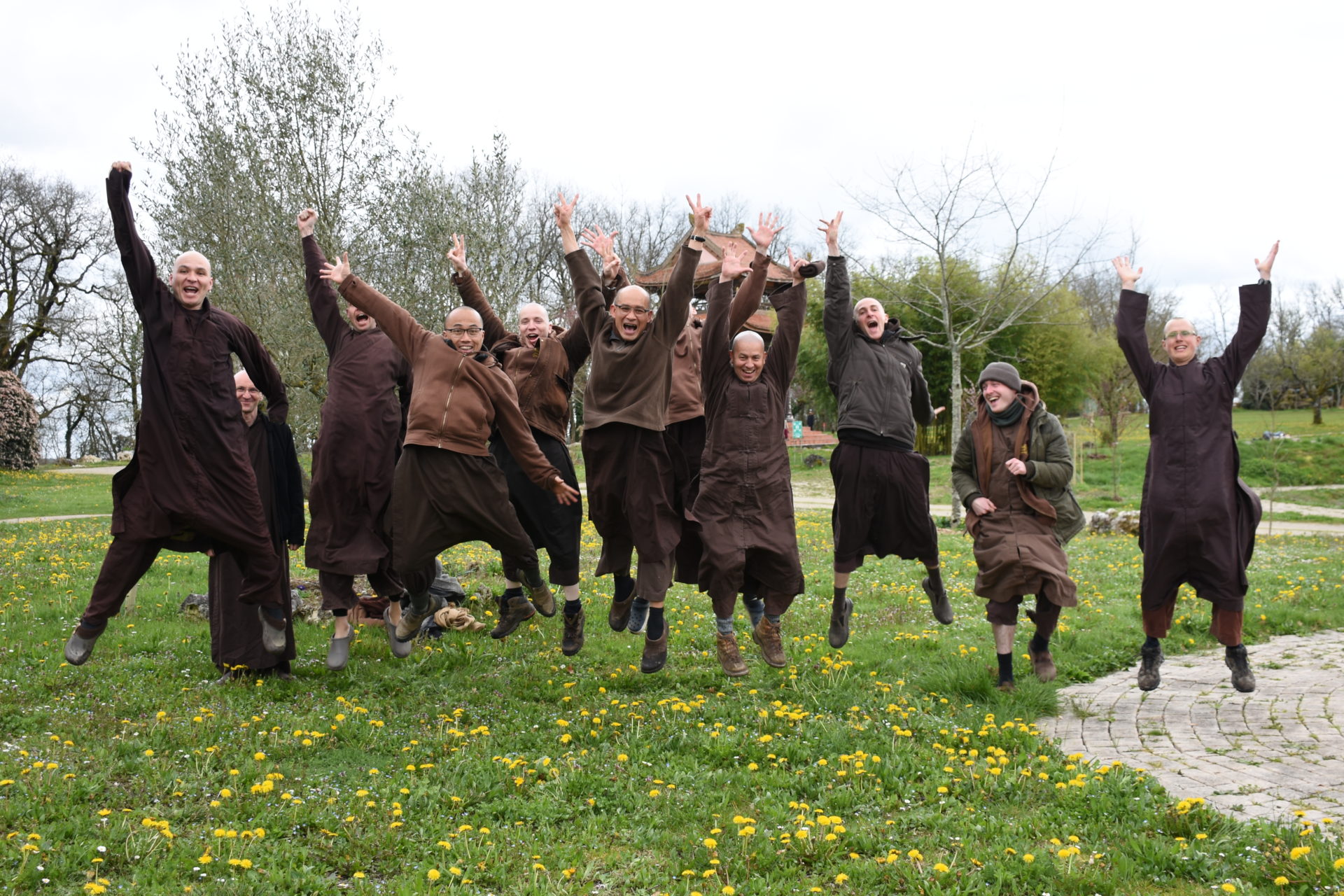Excerpt from a Dharma Talk during the Wake Up Ambassadors Online Retreat in May 2020
By Brother Pháp Dung in June 2021

Sangha Architecture
When I was studying architecture in Los Angeles, I suffered because the city was full of concrete and hard edges. So much empty space could have been used to grow plants.
Excerpt from a Dharma Talk during the Wake Up Ambassadors Online Retreat in May 2020
By Brother Pháp Dung in June 2021

Sangha Architecture
When I was studying architecture in Los Angeles, I suffered because the city was full of concrete and hard edges. So much empty space could have been used to grow plants. My friends and I were idealistic and optimistic. We wanted to bring more greenery into the city of Los Angeles and build skyscrapers with vegetation growing out of them, like big flower pots.
But architecture is a tough industry; it is a self-centered profession. Architects are often proud of their individual accomplishments, and it’s hard to survive with a social mission. I see friends struggle because they lack community. If you want to fulfill such an aspiration, and at the same time you want to have a family, you need a community to support you. You need uncles and aunties and lots of distant relatives. In fact, you need an entire village!
Communities have many advantages. Because of the lockdown, many couples might be stuck together twenty-four hours a day. I do not think we were designed to spend every waking hour with the same person. We need breaks from each other, and we need to interact with other people. Here in Plum Village, if I have a problem with one of my brothers, I have fifty other brothers I can spend time with. After a few days of separation, our energy can change, and I may be able to look at that brother differently and come to terms with him.
I know it is not easy to form a community, but going to Sangha is helpful. It definitely helped me while I was still living in LA. I spent four years with my local Sangha before becoming a monk, and I attended sitting meditation every day before work. Friday evenings, I went to Sangha instead of partying and spending money. It was purposely organized on Friday evenings for this reason.
Laying Bricks
Today, I would like to share with you two teachings that helped me. Since I came from an environment that was individualistic and competitive, the teachings helped me consciously develop a cooperative mindset. These are the teachings of “no busyness” and “no position.”
When I had become a novice, during the summer retreat, all the monks had to vacate their rooms and live in tents to give the rooms to our lay friends. We would camp around Thay’s hut, using bricks to build platforms for our tents. Everyone was on the lookout for bricks. If you found a brick, you grabbed it before someone else got it.
One day I was setting up my tent, and I was having a hard time putting the stakes in the ground. As I hammered them on one side, the ones on the other side came out. One of my brothers saw me struggle and came over to help. I unintentionally shoved him away with my elbow and insisted I could do it on my own. But right after that, I hit my finger with the hammer. I will never forget that moment, standing there with fingers bleeding.
That was a bell of mindfulness for me. I realized this was my old architect pride coming up. I did not want to accept help, because I would feel embarrassed admitting I could not do it on my own. By that time, I had been living in Plum Village for about a year and was already aware of the difficulties I had with other people. But at that moment, I realized my pride and how it related to my education. I saw my habit energies and became more careful with other subtle and hidden habits.
The Busyness of No Busyness
The teaching I want to share with you comes from Master Linji. It is the teaching of “no busyness” (vô sự in Vietnamese), or as Thay translates it, “busyness-less.” This is an important teaching for Wake Up ambassadors like you. We all want to do good by building a Sangha or being a good bell master, a facilitator, or an organizer. This is the busyness of the Buddha (phật sự in Vietnamese) or, as Thay would say, the enterprise of the Buddha.
But we have to be careful when doing this, because the habit of being busy is strong in our society. Outside the monastery, people praise and reward your achievements with pay raises or with your picture on the wall as employee of the month. We do not realize how harmful this is—to see our success as our own separate achievement—so we want more. In the monastery, however, it is the opposite. We train to be in touch with ourselves and our connection with others.
Vô sự also means to stop. Busynessless is stopping. Our culture is so busy; we have no time to look at ourselves and at what is really happening. The current pandemic is challenging for people, because we have to stop our busyness. At one point we could not even go outside, so there was no distraction and we were forced to look at ourselves. It is like an itch that cannot be scratched; it can be overwhelming. Many people recently shared with me the difficulties they had from feeling unproductive. It is our habit to produce things and want recognition for them.
Remove all the busyness and the labels you and those around you have put on you. Once you avoid these traps, you tune into a higher wavelength.
This is one of the causes of the situation our planet is in right now in terms of climate, and also in terms of happiness, depression, and injustice: our inability to stop and look at ourselves, our relentless desire to produce and distract ourselves. A small percentage of people consume a large part of our natural resources, trying to fill an inner sense of lack and discontent. But now we have an opportunity to stop and look. Instead of being productive, we can take care of and understand ourselves. This is productive spiritually. It can help us be happier, more fulfilled and peaceful. Having one less disgruntled person on the planet is useful and helpful.
When I sit in my room, enjoying tea, am I being productive or not? Vô sự—busynessless—is needed busyness for our times. My brothers cannot see me in my room, but when I come out, they know what I have produced. I am fresh; I am smiling. And that is very valuable. Our product is insight, joy, and peace. So we have to reorient our busyness. When things return to normal, let us not go back to the big normal—the productive normal. Let us return to a lighter normal with less harmful impact on ourselves and on the planet—one where we can tend to the “soft” busyness, the “heart” busyness, and take care of ourselves and each other as part of the Buddha’s busyness of no-busyness.
Lazy Training
Being busyless is a real training. That is why we have lazy day in Plum Village. Lazy day was very difficult for me when I first came to Plum Village. The word “lazy” made me feel guilty. We once asked Thay to change the name to “rest day” after hearing many friends share their unease with the term “lazy.” But Thay insisted that we never change it, because our aversion to the word “lazy” had touched a chord in the collective culture of needing to be busy and feeling guilty if we’re not.
I remember doing “hammock training.” I had to lie in the hammock and not do anything, not even drink tea or meditate. I was not supposed to nap or even think about resting. This was really difficult for me. I wanted to read a book. I wanted to cut my nails. I felt I always needed to be doing something to be productive. Even in my meditation, I was trying to achieve things. I could not just lie in a hammock. Hammock meditation proved to be the perfect remedy for me. It is not very Zen. It is very lazy. [Laughter] What I enjoyed about the hammock was the swinging. It made me feel like a child. Children love to go on the swing, but we have lost this “swing mind,” which is just swinging without any goal.

Present Moment
Vô sự also means “to be free.” To be free means to be in the present moment. You do not think about the future and are not burdened by the past. This does not mean we cannot think about the past or future. We can look ahead and plan, and we can look at our past and learn from it and be nourished by it. There is a time for thinking. But the best time for that is when your mind is clear, when you are peaceful and taking care of yourself. We have to be well established in the present moment for this. Breathing exercises are an important training for this. When strong emotions come up, we have to develop a strong habit of coming back to our breath and holding these sensations.
Usually, we think of freedom as a reaction against someone or something. We want to be free from it. In this case we want to be free from searching and wanting in the future and being burdened by the past. Being free is not a declaration against something; it means being fully present.
How to Stop Getting Hooked
Vô sự also means to be free from grasping. It is important to be aware of this when building a Sangha. Wanting to succeed will make you lose your peace. In the monastery, we train a lot in this. For example, any time we discuss the architecture or planning of Plum Village, I tend to jump in with a lot of great ideas. This is grasping, so there is a little game I play with my brother. When he sees me wanting to jump in, he puts his finger in his mouth like a hook. If he catches me before I share, then I have to keep my mouth shut for the entire meeting. This is a real training. Normally, outside of the monastery, when you have a good idea, you want to be heard. But here, it does not really matter. What matters is that you train yourself not to grasp. That is freedom.
If you spend enough time in Plum Village, you will start to see the impermanence of your ideas. A good idea only exists in one particular moment. A few months later, you will have another idea. Things change. One good way to train like this in Upper Hamlet is to be the gardener. If you become the gardener, you will have many ideas about the garden. You become very protective, and you see every plant as your personal property. When somebody else trims a tree, you get upset and want to find out who did it. But one year later, when you are no longer the gardener, you will be free from all of it. You will wonder how you could have been so caught up. It does not matter how the garden is tended. Everybody has their own way, and they are all good. You are happy with however it is done, and you feel free.
Another good training is being the shopper. Everybody in the monastery has an opinion about what kind of food we should buy. Similarly, car manager and work coordinator are also good trainings. The training is not about trying to be successful, but about trying not to grasp. If you train in this way, you will be happier and more peaceful in your work. I do not mean we should not work or plan, but we should let go of our ideas and our identification with them.
Busynessless is about not losing yourself in something. If you are working hard in Plum Village, and the rest of the community never sees you, you are not doing a good job. You need to show up and be part of the community. We can tell when someone is lost in their project, like we know when we are lost in our own project. Even if you are doing good work, and you are getting a lot of praise, do not lose yourself. Without bodhicitta, the mind of insight, you will delude yourself. You will start to get disconnected. If someone else has an idea, you will block it. It is good to have aspirations, but do not get caught in them.
These are some of the difficulties I went through while trying to “de-onionize” myself. I had to peel off all these layers. I thought they smelled good, but they actually made people cry. It is a slow process. I am sure I have many more layers, which are still causing a lot of suffering.
Nowhere Man
You can read more about Master Linji in Thay’s book, Zen Battles. These teachings are a great medicine for our generation, which is full of high achievers. In the introduction, Thay calls Linji’s teaching a laxative. Usually when you read a book, you want to learn something new. But Linji’s teaching will not give you anything; instead, it will remove everything. Linji was born to remove Buddhism from people’s heads. In his day, many monks were studying Buddhism but were disconnected from the practice and the world around them.
Related to vô sự, Linji has another teaching: vô vi, meaning “no position” or “no identity.” Do not build yourself up or create a position for yourself. Do not get ahead of yourself because you are a Wake Up Ambassador or an Order of Interbeing member. Everybody is unique, but if you try too hard, your identity becomes a burden. Once you become free, you will naturally be who you are. Thay has a calligraphy: “Be beautiful, be yourself.” When we are free and we do not identify with anything, we become naturally beautiful. This is not a kind of beauty you build up or accumulate. It comes when you let go.
Buddhism is the practice of letting go, not achieving more. It is the opposite of the training we get in society. Buddhism teaches us that sitting in silence can be more powerful than doing something. I think the Beatles must have read Linji when they wrote the song Nowhere Man.
Nowhere man, please listen
You don’t know what you’re missing
…
He’s a real nowhere man
Sitting in his nowhere land
Making all his nowhere plans for nobody
Be careful with the ideas you have about yourself. Someone who has no position can be free from notions about themselves. When you get involved in Sangha building, people will start putting labels on you. They might think, for instance, that you are great with technology. That label will stick to you, and everyone will come to you with their Internet issues. That can become a source of suffering, because you feel you have a certain position and you have to act accordingly.
This teaching runs contrary to society. In society, you have an ID; you have diplomas and certificates; you are a member of certain groups. You have to be careful not to think you are those things. You are more than those conventional designations. They can isolate us. They make us lock ourselves in little boxes and keep us from touching true beauty and true happiness. Vô vi means no more boxes.
This is the teaching of Linji. He used quite harsh words and even called his monks bad names. He would say things like, “You brown bag of you know what sitting there with your bald head: you are the Buddha!” Some texts depict him as very mean, but Thay presents him in a more compassionate way.
If Linji were alive today, he would tell us to stop building our virtual self and to stop paying attention to those likes and clicks. He would tell us to get offline, because we are more than our screen. It doesn’t matter how many people like your website. Why do you need to post all those pictures of yourself? We are trying so hard to look good. My sister-in-law has this app that automatically filters all the little impurities from someone’s face. She took a picture of me, and I felt that I looked like a toy. We can hardly take care of ourselves because we have our virtual selves to take care of. [Laughter]
Master Linji was translating the Buddhist teaching of non-self. I think he is still relevant today. We are so busy; we always want to achieve success. Nowadays the coolest thing is to begin a startup, sell it, and become a millionaire. Any time one of our brothers or sisters comes back from the San Francisco Bay Area, they come back with new endeavors and ideas for projects.
Back to Normal
And now we are all experiencing this pandemic. It involves a lot of suffering. Many people are losing loved ones. The politicians are trying to figure out how to bring things back to normal. I think it is a wonderful opportunity for us to reflect on how we want to organize society. We have become more and more disconnected, and have less leisure and less time for each other. When I was a kid in the US, I could ride my bike as far as I wanted. My niece and nephew today cannot do that. As soon as they disappear from sight, their parents go look for them.
We have become more technologically advanced, but we have lost touch with the human and environmental aspects of life. The pandemic is showing us that we cannot mess with the natural world without facing consequences. I hope and pray that people are waking up. We humans have become too dominant in the world. Our impact is too big.
As Sangha builders, we become part of the movement that Thay started. There might not be a war directly in front of us, but there is a revolution happening. It is a revolution for your freedom and your happiness. We might not be rebuilding villages destroyed by bombs, as Thay did, but we need to build a village that has real happiness and real freedom. We need to deepen our connection. This is what the Wake Up movement is about for me. We might not all be able to live in community, but we need to make space for everyone. Please visit our practice centers and join a Sangha.
Take These Chains from Your Heart
Many young people are coming to Plum Village to live here on our Happy Farm. It is not easy to make such a commitment.
It is quite scary. You need to let go of your idea of security. You do not know what will happen when you leave. Where are you going to live? What about your savings, your pension plan, your health insurance? These fears keep people from doing what is in their heart. Society has put this net of false security around us, holding us back. But what is the purpose of life if it is not to follow your heart? Be wary of the conventions of society. They might keep you from realizing your aspiration to serve people and transform society.
When you can connect with your heart’s desire to make the world a better place, you will thrive. You will be happier and more energetic. Look at me. I am a monk. If I quit, I am done for. I do not have insurance; I have no health care or retirement plan. But I trust that wherever I go, if I serve people, the universe will provide for me. On one hand, you have to understand and transform yourself. On the other hand, you have to remove all society’s conventions and positions. Remove all the busyness and the labels you and those around you have put on you. Once you avoid these traps, you tune into a higher wavelength.
Community Is the Key
I hope this is not too challenging and that you got something out of my talk. I have shared with you from my heart and from my own experience growing up wanting to achieve. I learned how to achieve things internally. And now my busyness is to help other people do the same. I do not think it is our purpose to keep the economy going. In America, they always say, “It’s the economy, stupid!” But the economy is not a good thing. Do not go back to normal. Go back to being beautiful and being yourself. Together we can be free.
And the key to achieve this is community. You cannot do it on your own. If I could bring all of you here in Plum Village, I would try to convince you to stay here and let go of your bank accounts. I am not sure what your parents would think. [Laughter] It is hard to build community in an urban environment. Yet my dream is to create them there also, not just in the Pure Land in Plum Village, but also in the middle of concrete and asphalt. And I am looking at you, Wake Up ambassadors, for this. I hope we can create spaces in the middle of the city where you do not need to buy anything, but you can just be yourself. I call them Wake Up Hubs.
So please keep the Wake Up energy alive. It was nice connecting with you. I hope I did not offend anyone. Talking to Wake Up somehow makes me feel more relaxed and joking. [Laughter] I feel very close to all of you, because you have this energy of transforming the world. Thank you for joining and good luck.
REPRINTED WITH PERMISSION FROM WKUP.ORG.
TRANSCRIBED BY DIANE F. WYZGA. EDITED BY JAZZ VAN DEN BROECK.


